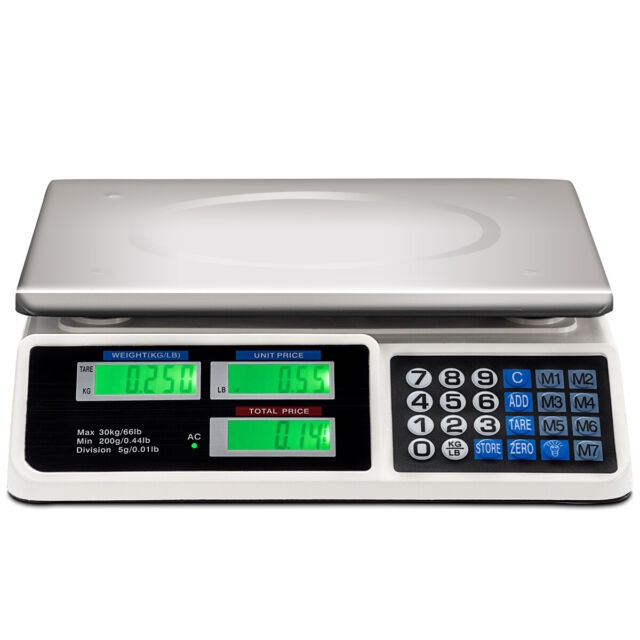Commercial scales are essential tools in various industries, providing accurate measurements that are crucial for business operations, quality control, and regulatory compliance. From retail to manufacturing, logistics to healthcare, understanding the different types of commercial scales, their applications.
Types of Commercial Scales
Commercial scales come in various types, each designed for specific applications and environments. The common types of commercial scales include:
Retail Scales: Used in supermarkets, grocery stores, and retail outlets for weighing products such as fruits, vegetables, meat, and packaged goods. These scales often have price computing capabilities for calculating the cost based on weight.
Industrial Scales: Designed for heavy-duty applications in industries such as manufacturing, logistics, and warehouses. Industrial scales can handle large and bulky items, pallets, and containers, providing accurate weight measurements for inventory management and shipping.
Laboratory Scales: Precision instruments used in laboratories, pharmaceuticals, and research facilities for measuring small quantities of substances with high accuracy. Laboratory scales come in various types, including analytical balances, precision balances, and microbalances, tailored to specific measurement requirements.
Medical Scales: Utilized in healthcare settings such as hospitals, clinics, and fitness centers for measuring patient weight, BMI (Body Mass Index), and other health metrics. Medical scales include digital weighing scales, wheelchair scales, and infant scales, ensuring accurate and reliable measurements for patient care.
Vehicle Scales: Also known as weighbridges or truck scales, these are used for weighing vehicles, trucks, and trailers to determine their load weight. Vehicle scales are crucial for industries involved in transportation, logistics, and agriculture, ensuring compliance with weight regulations and safety standards.
Applications Across Industries
Commercial scales find applications across diverse industries, contributing to efficient operations, quality control, and regulatory compliance:
Retail Industry: Retail scales are used for weighing and pricing products in supermarkets, delis, bakeries, and specialty stores. They help ensure accurate pricing, inventory management, and customer satisfaction.
Manufacturing Sector: Industrial scales play a vital role in manufacturing processes, where precise weight measurements are essential for quality control, batch tracking, and material handling. They are used in industries such as food processing, automotive, aerospace, and chemical manufacturing.
Logistics and Warehousing: Industrial scales and vehicle scales are integral to logistics and warehouse operations for weighing incoming and outgoing shipments, pallets, and containers. Accurate weight measurements facilitate efficient inventory management, shipping, and compliance with transportation regulations.
Healthcare and Fitness: Medical scales are indispensable in healthcare facilities for monitoring patient weight, assessing health indicators, and managing treatment plans. Fitness centers use scales for tracking progress, setting fitness goals, and promoting wellness.
Pharmaceutical and Laboratory Settings: Laboratory scales are critical in pharmaceutical research, formulation, and quality control, ensuring precise measurements of chemicals, compounds, and ingredients. They are also used in environmental testing, forensic analysis, and educational institutions.
Best Practices for Using Commercial Scales
To maximize the accuracy, reliability, and longevity of commercial scales, businesses should follow best practices:
Choose the Right Scale: Select a scale that suits your specific application, capacity requirements, and environmental conditions. Consider factors such as accuracy, durability, readability, and connectivity options.
Calibration and Maintenance: Regularly calibrate scales according to manufacturer guidelines using certified weights. Perform routine maintenance, cleaning, and inspection to ensure optimal performance and accuracy.
Proper Handling: Handle scales with care to avoid damage or misalignment of components. Avoid overloading scales beyond their rated capacity, as this can affect accuracy and lead to premature wear.
Environment Control: Place scales on stable, level surfaces free from vibrations, air currents, and temperature fluctuations. Control environmental factors to minimize interference with scale readings.
User Training: Train operators and users on proper scale usage, calibration procedures, and safety protocols. Ensure staff understand the limitations and capabilities of the scale they are using.
Compliance and Documentation: Adhere to industry regulations, standards, and legal requirements related to scale usage, calibration, and record-keeping. Maintain accurate documentation of calibration dates, results, and maintenance activities.
Conclusion
Commercial scales are indispensable tools across various industries, supporting critical functions such as weighing products, monitoring health metrics, managing inventory, and ensuring regulatory compliance. Understanding the types of commercial scales available, their applications, and best practices for their use is essential for businesses to achieve accurate measurements, operational efficiency, and customer satisfaction. By investing in quality scales, following proper maintenance procedures, and training staff on best practices, businesses can harness the full potential of commercial scales for success in their respective industries.


No comments yet